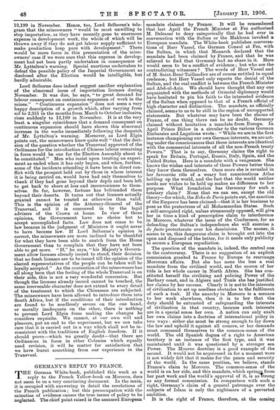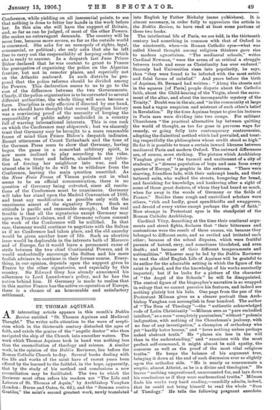GERMANY'S REPLY TO FRANCE. T HE German White-book, published this week
as a reply to the French Yellow-book on Morocco, does not seem to us a very convincing document. In the main, it is occupied with answering in detail the revelations of the French publication ; but this preoccupation with the minutiae of evidence causes the true issues of policy to be neglected. The chief point raised is the assumed European mandate claimed by France. It will be remembered that last April the French Minister at Fez authorised M. Delcasse to deny categorically that he had ever in conversation with the Sultan or the Makhzan invoked a European mandate. The White-book publishes conversa- tions of Herr Vassel, the German Consul at Fez, with the Sultan, in which that Monarch declared that the mandate had been claimed by France, and that he was relieved to find that Germany had no share in it. Here would seem to be a conflict of evidence ; but who are the contradicting witnesses ? The words of Herr Vassel and of M. Saint-Rene Taillandier are of course entitled to equal credence; but Herr Vassel only reports the denial of the Sultan, and the real conflict is between the French Minister and Abd-ul-Aziz. We should have thought that any one acquainted with the methods of Oriental diplomacy would have hesitated to pin his faith to the interested evidence of the Sultan when opposed to that of a French official of high character and distinction. The mandate, as officially claimed, seems to us to be still in the rection of unsupported statements. But whatever may have °been the claims of France, of one thing there can be no doubt. Germany claimed without hesitation a mandate from Europe. In April Prince Billow in a circular to the various German Embassies and Legations wrote : " While we are in the first instance championing our own German interests, we are act- ing under the consciousness that these interests are identical with the commercial interests of all the non-French treaty Powers." That is to say, Germany claims the right to speak for Britain, Portugal, Russia, Italy, Spain, and the United States. Here is a mandate with a vengeance. She knows the wishes and interests of these Powers better than they know them themselves. Once more she is revealed in her favourite role of a weary but conscientious Atlas holding up the world, and the fact that the world neither needs nor wishes to be held up makes no difference to her purpose. What foundation has Germany for such a tutelary claim ? None that we can see, except the old theory—for which, the Echo de Paris points out, the sanction of the Emperor has been claimed—that it is her business to pose as the protectress of all Mohammedan States. Such a self-arrogated right, unless strenuously opposed, will give her in time a kind of prescriptive claim to interference in Morocco, whatever the issue of the Conference, for as defending the Sultan's independence she will exercise a de facto protectorate over his dominions. The sooner, it seems to us, this dangerous claim is brought out into the open and disposed of the better, for it needs only publicity to secure a European repudiation.
The question of the mandate is, indeed, the central one in the controversy. There is no suggestion of an explicit commission granted to France by Europe to rearrange Moroccan affairs. But she has none the less a real mandate from the civilised world, and the source of her title is her whole career in North Africa. She has con- stituted herself the civilising and policing Power of the Barbary coast, and in Algiers and Tunis she has justified her claims by her success. Clearly it is not to the interests of civilisation to set up needless obstacles to the fulfilment of such a task. If the anarchy in Morocco is a menace to her work elsewhere, then it is to her that the duty should be entrusted of safeguarding the interests of civilisation in that country, acause such interests are in a special sense her own. A nation can only exalt her own claims into a doctrine of international policy in two ways : either she must be strong enough to lay down the law and uphold it against all comers, or her demands must commend themselves to the common-sense of the world. The old Spanish dogma of a right to American territory is an instance of the first type, and it was maintained until it was questioned by a stronger sea Power. The Monroe doctrine is a, good example of the second. It would not be acquiesced in for a moment were it not widely felt that it makes for the peace and security of the world. In the same position, we believe, stands France's claim to Morocco. The common-sense of the world is on her side, and this mandate, which spring from her past work and the world's approval of it, is as' trong as any formal commission. In comparison with such a right, Germany's claim of a general patronage over the subjects of Islam is only the nightmare of a perverted ambition.
It is the right of France, therefore, at the coming Conference, while yielding on all inessential points, to see that nothing is done to fetter her hands in the work before her. In this aim she will have the support of Britain, and, so far as can be judged, of most of the other Powers. She makes no extravagant demands. The country will be more'free, because more secure, so far as the outside world is concerned. She asks for no monopoly of rights, legal, commercial, or political ; she only asks that she be left free to carry out the responsibility of keeping order which she is ready to assume. In a despatch last June Prince Billow declared that he was content to grant to France the prerogative of organising the police on the Algerian frontier, but not in remoter places, and especially not on the Atlantic seaboard. In such districts he pro- posed that the police reforms should be divided among the Powers. This declaration seems to us to go to the root of the difference between the two Governments. Clearly, if the police organisation is to be entrusted to several different authorities, the whole thing will soon become a farce. Discipline is only effective if directed by one hand, and we should have thought that recent Egyptian history was a convincing proof of the necessity of keeping the responsibility of public safety undivided in a country full of warring international interests. This is one rock on which the Conference may shipwreck ; but we sincerely trust that Germany may be brought to a more reasonable frame of mind than Prince Biilow's despatch indicates. Recent utterances of Count Tattenbach and the tone of the German Press seem to show that Germany, having begun the game in a somewhat arbitrary spirit, is now more inclined to play according to the rules. She has, we trust and believe, abandoned any inten- tion of forcing her neighbour into war, and the utmost she is likely to do will be to withdraw from the Conference, leaving the main question unsettled. As the Neue Freie Presse of Vienna points out in what seems to be an official communication, there is no question of Germany being outvoted, since all resolu- tions of the Conference must be unanimous. Germany will take her stand upon the Madrid Convention of 1880, and treat any modification as possible only with the unanimous assent of the signatory Powers. Such an attitude is pacific and reasonable enough ; but the real trouble is that all the signatories except Germany may agree on France's claims, and if Germany refuses consent the work of the Conference will be nullified. In that case, Germany would continue to negotiate with the Sultan as if no Conference had taken place, and the old anarchy would be given another lease of life. Such an abortive issue would be deplorable in the interests both of Morocco and of Europe, for it would leave a permanent cause of strife between the two chief Continental Powers, and it would undoubtedly encourage the Sultan and his more foolish advisers to continue in their former course. Every- thing, iu our opinion, depends upon the support given to France by the other signatories, and especially by this country. Sir Edward Grey has already announced his adherence to Lord Lansdowne's policy, and he has the nation behind him. If Germany is made to realise that in this matter France has the active co-operation of Europe, there is a chance of an honourable and satisfactory settlement.











































 Previous page
Previous page